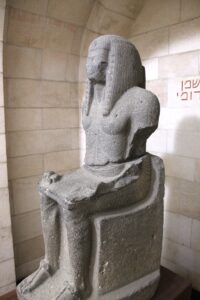
Statue of Ramesses III at the Rockefeller Museum, Jerusalem. By Davidbena – Own work, CC BY-SA 4.0, https://commons.wikimedia.org/w/index.php?curid=79804593
The following rejoinder does not make easy reading; but a careful study of it will be well repaid. Both the original article by Bryant Wood and this rejoinder by Itamar Singer attempt to assess a large mass of archaeological and textual evidence to determine a major historical event–the Philistine entry and occupation of Canaan. Scholars are clearly divided between two contesting historical reconstructions. Which is correct is perhaps not as important as how they reason, how they attempt to develop arguments from a large number of archaeological excavations and several obscure textual references. If nothing else, the reader will gain an appreciation of just how difficult the ancient historian’s task is.—Ed.
In his article “The Philistines Enter Canaan—Were They Egyptian Lackeys or Invading Conquerors?” BAR 17-06, Bryant G. Wood revives an old debate without really adding new arguments1. The issue, briefly, is this- According to the traditional view (Albrecht Alt), which I follow, Pharaoh Ramesses III tightened his control over Palestine, settling Philistines and other Sea Peoples captives in Egyptian strongholds along the coast after having defeated them in northern Phoenicia (in 1175 B.C.). The opposing view (Manfred Bietak), followed by Wood, maintains that by this time the Egyptians bad already lost control over coastal Palestine, which had been devastated and then settled by the Philistine invaders. Theoretically, both scenarios are possible, but the weight of evidence, both textual and archaeological, clearly favors the traditional view.
Read the rest of How Did the Philistines Enter Canaan? A Rejoinder in the online Biblical Archaeology Society Library.